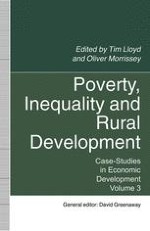1994 | OriginalPaper | Buchkapitel
Is China Egalitarian?
verfasst von : J. B. Knight
Erschienen in: Poverty, Inequality and Rural Development
Verlag: Palgrave Macmillan UK
Enthalten in: Professional Book Archive
Aktivieren Sie unsere intelligente Suche, um passende Fachinhalte oder Patente zu finden.
Wählen Sie Textabschnitte aus um mit Künstlicher Intelligenz passenden Patente zu finden. powered by
Markieren Sie Textabschnitte, um KI-gestützt weitere passende Inhalte zu finden. powered by
Concern for equality is a phenomenon that runs deep in Chinese culture, and it is not just to be found under China’s communist government of the past forty years. Confucius, writing in 500 BC, put it as follows: ‘What worries those who have the state and family under their charge is not the scantiness of wealth but its inequality of distribution — not poverty but disquietude. Under equal distribution there will be no feeling of poverty’ (quoted in Hu Jichuang, 1988). Since the communists came to power in 1949 the Chinese government has adopted objectives that are extremely egalitarian by comparison with other developing countries. Moreover, the high degree of central planning gave the state great powers to pursue these objectives: it had redistributive instruments not available in a mixed economy. The ‘three great inequalities’, as they have been called — inter-regional, rural-urban and intra-work unit — have been consistently addressed by policy-makers. There are at least four interesting questions: (i)Does a socialist strategy of development result in an egalitarian society?(ii)How does the distribution of income in China compare with that in other developing countries which have relied more on market forces?(iii)In the Chinese experience, are there trade-offs apparent between efficiency and equality, and between growth and equality?(iv)How is the distribution of income changing as a result of the economic reforms that began in 1978?
